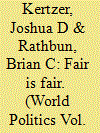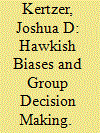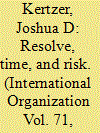|
|
|
Sort Order |
|
|
|
Items / Page
|
|
|
|
|
|
|
| Srl | Item |
| 1 |
ID:
141815


|
|
|
|
|
| Summary/Abstract |
Behavioral economics has shown that people often diverge from classical assumptions about self-interested behavior: they have social preferences and are concerned about issues of fairness and reciprocity. Social psychologists show that these preferences vary across actors, with some displaying more prosocial value orientations than others. Integrating a laboratory bargaining experiment with original archival research on Anglo-French and Franco-German diplomacy during the interwar period, the authors show how fairness and reciprocity matter in social interactions. That prosocials do not exploit their bargaining leverage to the degree that proselfs do helps explain why some pairs of actors are better able to avoid bargaining failure than others. In the face of consistent egoism on the part of negotiating partners, however, prosocials engage in negative reciprocity and adopt the same behaviors as proselfs.
|
|
|
|
|
|
|
|
|
|
|
|
|
|
|
|
| 2 |
ID:
117518


|
|
|
|
|
| Publication |
2012.
|
| Summary/Abstract |
International Relations scholars have long debated whether the American public is allergic to realism, which raises the question of how they would "contract" it in the first place. We argue that realism isn't just an IR paradigm, but a belief system, whose relationship with other ideological systems in public opinion has rarely been fully examined. Operationalizing this disposition in ordinary citizens as "folk realism," we investigate its relationship with a variety of personality traits, foreign policy orientations, and political knowledge. We then present the results of a laboratory experiment probing psychological microfoundations for realist theory, manipulating the amount of information subjects have about a foreign policy conflict to determine whether uncertainty leads individuals to adopt more realist views, and whether realists and idealists respond to uncertainty and fear differently. We find that many of realism's causal mechanisms are conditional on whether subjects already hold realist views, and suggest that emotions like fear may play a larger role in realist theory than many realists have assumed.
|
|
|
|
|
|
|
|
|
|
|
|
|
|
|
|
| 3 |
ID:
084641


|
|
|
|
|
| Publication |
2008.
|
| Summary/Abstract |
There has been much controversy over the role that ethnic diasporas (sometimes called "lobbies") do or should play in shaping American foreign policy. This article looks at one particular ethnic group, American Jews, with a view to assessing the claim made by some authors, to the effect that "neoconservatism" has been influenced considerably by Judaism. The article mostly debunks that claim, at least if the suggestion is that something about Judaism as a religion can help account for the policy agendas espoused by neoconservatives in recent years. However, the authors do argue that a "geo-ethnic" link can be established between a Jewish diaspora in America and the evolution of neoconservatism. Their claim is that a "borderlands" tradition emanating originally on the Russian frontier in the latter part of the nineteenth century was exported to America, through the migration of peoples they refer to as "new borderers." This folk community, the authors argue, coalesced with another, well-established, folk community of "borderers" (the Scotch-Irish), resulting in the formation of the coalition known in recent years as neoconservatism - a coalition representing a fusion of Jacksonianism and Wilsonianism.
|
|
|
|
|
|
|
|
|
|
|
|
|
|
|
|
| 4 |
ID:
186591


|
|
|
|
|
| Summary/Abstract |
How do cognitive biases relevant to foreign policy decision making aggregate in groups? Many tendencies identified in the behavioral decision-making literature—such as reactive devaluation, the intentionality bias, and risk seeking in the domain of losses—have been linked to hawkishness in foreign policy choices, potentially increasing the risk of conflict, but how these “hawkish biases” operate in the small-group contexts in which foreign policy decisions are often made is unknown. We field three large-scale group experiments to test how these biases aggregate in groups. We find that groups are just as susceptible as individuals to these canonical biases, with neither hierarchical nor horizontal group decision-making structures significantly attenuating the magnitude of bias. Moreover, diverse groups perform similarly to more homogeneous ones, exhibiting similar degrees of bias and marginally increased risk of dissension. These results suggest that at least with these types of biases, the “aggregation problem” may be less problematic for psychological theories in international relations than some critics have argued. This has important implications for understanding foreign policy decision making, the role of group processes, and the behavioral revolution in international relations.
|
|
|
|
|
|
|
|
|
|
|
|
|
|
|
|
| 5 |
ID:
153555


|
|
|
|
|
| Summary/Abstract |
Psychology is traditionally used in political science to explain deviations from rationality. Lost in the debate between rationalists and their critics, however, is a sense of whether the kinds of strategic self-interested behavior predicted by these models has psychological microfoundations: what would homo economicus look like in the real world? We argue that strategic rationality varies across individuals and is characterized by a pro-self social-value orientation and a high level of epistemic motivation. Testing our argument in the context of international relations, we employ a laboratory bargaining game and integrate it with archival research on German foreign policy-making in the 1920s. We find in both contexts that even among those interested in maximizing only their own egoistic gains, those with greater epistemic motivation are better able to adapt to the strategic situation, particularly the distribution of power. Our results build a bridge between two approaches often considered to be antithetical to one another.
|
|
|
|
|
|
|
|
|
|
|
|
|
|
|
|
| 6 |
ID:
171167


|
|
|
|
|
| Summary/Abstract |
Canonical models of costly signaling in international relations (IR) tend to assume costly signals speak for themselves: a signal's costliness is typically understood to be a function of the signal, not the perceptions of the recipient. Integrating the study of signaling in IR with research on motivated skepticism and asymmetric updating from political psychology, we show that individuals’ tendencies to embrace information consistent with their overarching belief systems (and dismiss information inconsistent with it) has important implications for how signals are interpreted. We test our theory in the context of the 2015 Joint Comprehensive Plan of Action (JCPOA) on Iran, combining two survey experiments fielded on members of the American mass public. We find patterns consistent with motivated skepticism: the individuals most likely to update their beliefs are those who need reassurance the least, such that costly signals cause polarization rather than convergence. Successful signaling therefore requires knowing something about the orientations of the signal's recipient.
|
|
|
|
|
|
|
|
|
|
|
|
|
|
|
|
| 7 |
ID:
153558


|
|
|
|
|
| Summary/Abstract |
Why do some actors in international politics display remarkable persistence in wartime, while others “cut and run” at the first sign of trouble? I offer a behavioral theory of resolve, suggesting that variation in time and risk preferences can help explain why some actors display more resolve than others. I test the theory experimentally in the context of public opinion about military interventions. The results not only help explain why certain types of costs of war loom larger for certain types of actors but also shed light on some of the behavioral revolution's contributions more broadly.
|
|
|
|
|
|
|
|
|
|
|
|
|
|
|
|
|
|
|
|
|